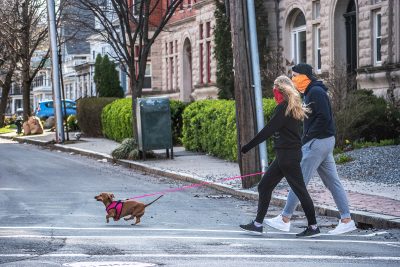With coronavirus infections rising and personal protection equipment dwindling, health care workers across the country continue to risk their lives with limited supplies.
In Massachusetts, some residents have been spending much of their quarantine sewing homemade face masks to donate to hospitals and other care facilities quickly running low on surgical and N95 masks.

The practice has been gaining traction nationwide as people, especially those who cannot donate financially, find new avenues to help relieve an overwhelmed health care system.
Mohamad Yasmin, a physician and team lead for the Massachusetts COVID-19 Academic Public Health Volunteer Corps, said he has watched the mask deficit grow as people, health care workers included, began hoarding out of panic.
“Everybody went out and got one,” Yasmin said. “It just kind of overwhelmed the system.”
Wearing masks are most helpful when the wearer has symptomatic cases of the virus, Yasmin said, echoing what most U.S. medical professionals emphasized when the outbreak first began trickling into the country.
“That being said, in theory, if everybody had one on at all times, of course, it would be better,” Yasmin said. “But how feasible is that?”
Numerous online communities have sprung up to connect local mask makers in search of fabric and elastic with those willing to share their own surplus of these materials.
35-year-old Christine Rondeau of Auburn had previous experience sewing quilts and pillowcases before she began sewing masks to donate to hospital workers. Rondeau said she sews from 10 p.m. to 2 a.m. most nights while also caring for her toddler and young child.
When she first started, Rondeau said, making one mask took her 12 minutes, but now that number is down to nearly five minutes.
Since Rondeau began posting on Facebook to seek fabric donations, several women have contacted her about learning how to sew. One woman, after reaching out for encouragement from Rondeau, began trying it herself.
“She taught herself how to sew,” Rondeau said. “Never sewed a day in her life, and has sewed over 300 masks now. How impressive is that?”
A coworker of Rondeau’s also learned how to sew masks after the two convened over video chat. Rondeau said she sent her some materials to get her started.
“It just inspires me of the strength of women, and just how they’re like, ‘Okay. I’m going to learn something and I’m going to help,’” Rondeau said. “And I had no idea that me trying to get fabric donations would lead to that.”
In lieu of a filter pocket normally present in professional masks, Rondeau makes her masks with an extra layer of either fleece or other fabric to deliver added protection, in alignment with U.S. Centers for Disease Control guidelines.
General public health guidelines initially dismissed the use of face masks in public unless the individual was already infected. As confirmed cases continued to rise, however, many municipalities have begun enforcing mandatory mask-wearing.
“Even if it wasn’t based on historically what the research has shown, the recommendations became stronger and stronger gradually,” Yasmin said.
People who reach out to Rondeau via Facebook then pick up the masks from her doorstep. Among them have been an emergency room nurse from Framingham, as well as paramedics and hospice nurses who have contacted her online.
Rondeau has donated about 200 masks to front-line workers while also handing them out to others who are high-risk in the community, such as the immunocompromised or the elderly, and those who are simply anxious about current circumstances.
“I just feel like if this is upsetting you, and me making a mask for you can give you a tiny bit of peace, I’m going to do it,” Rondeau said.
Meanwhile, people who have had their normal employment disrupted have also turned to sew masks as a way to make use of their skills and offer a vital resource to their communities while they are confined at home.
Such is the case for 32-year-old special education teacher Erica Joyce of Somerville, who joined the effort to produce homemade masks because sewing and quilting had already been a hobby for her.
“When I heard people needed this, it felt like a no brainer,” Joyce wrote on Messenger. “I have the skill, without a doubt I had to.”
Joyce chooses only to donate, partly because some who opt to sell their masks have lost work whereas she still has full employment. She wrote she does not want to compete for supplementary income with those who need it more.
“Lots of people have offered to buy masks from me, but for me, it’s not about that,” Joyce wrote. “It’s about making sure that everybody has one and can be protected.”

























































































































Kate Lindo • May 1, 2020 at 1:48 am
Thanks to Science